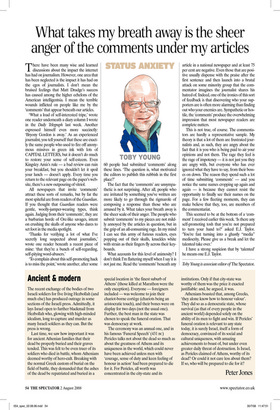Ancient & modern
The recent exchange of the bodies of two Israeli soldiers for five living Hezbollah (and much else) has produced outrage in some sections of the Israeli press. Admittedly, it lays Israel open to further blackmail from Hezbollah who, glowing with high-minded idealism, long to capture and murder as many Israeli soldiers as they can. But the press is wrong.
Last time, we saw how important it was for ancient Athenian families that their dead be properly buried and their graves tended. This was felt to be even truer of its soldiers who died in battle, whom Athenians deemed worthy of hero-cult. Breaking with the normal Greek custom of burial on the field of battle, they demanded that the ashes of the dead be repatriated and buried in a special location in ‘the finest suburb of Athens’ (those killed at Marathon were the only exception). Everyone — foreigners included — was welcome to join their chariot-borne cortège (chariots being an aristocratic touch), and their bones were on display for two days (not the usual one). Further, the best man in the state was chosen to speak the funeral oration. That was democracy at work.
The ceremony was an annual one, and in his famous ‘Funeral Speech’ (431 BC) Pericles talks not about the dead so much as about the greatness of Athens and its uniqueness in the world, which could never have been achieved unless men with ‘courage, sense of duty and keen feeling of honour in action’ had been prepared to die for it. For Pericles, all worth was concentrated in the city-state and its institutions. Only if that city-state was worthy of them was the price it exacted justifiable: and, he argued, it was.
Athenians boasted that, among Greeks, ‘they alone know how to honour valour’. They did so as a democratic state, whose survival (as that of every people in the ancient world) depended solely on the ability of its men to fight and win. If Pericles’ funeral oration is relevant to any state today, it is surely Israel, itself a form of democracy, convinced of its social and cultural uniqueness, with amazing achievements to boast of, but under even greater daily threat of destruction. Is Israel, as Pericles claimed of Athens, worthy of its dead? Or could it not care less about them? If so, who will be prepared to die for it?
Peter Jones


























































 Previous page
Previous page